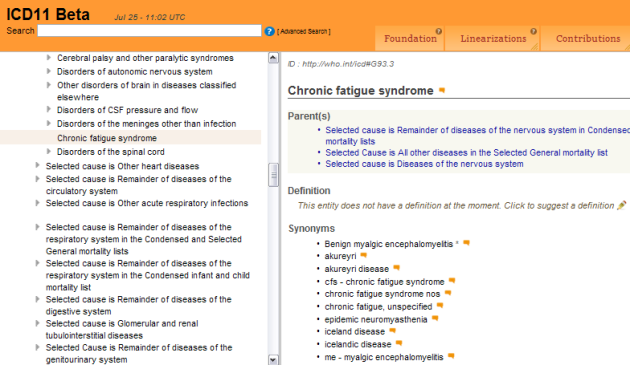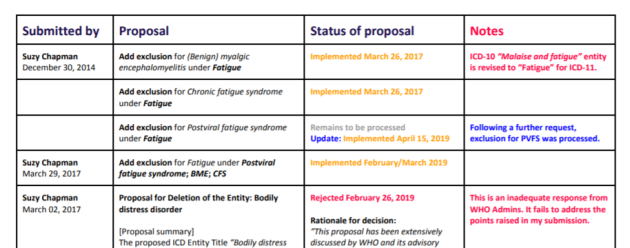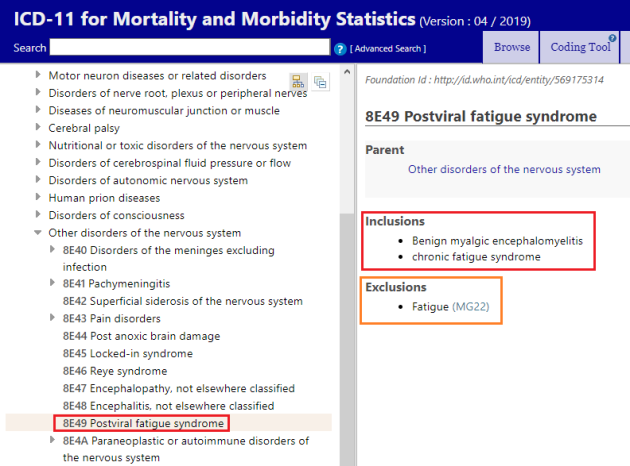June 10, 2015
by admindxrw
Update: June 12, 2015: This situation is now being looked into by a member of the recently assembled ICD-11 Project Management team.
As previously posted:
Although the development process for ICD-11 has been in progress for eight years, it’s still not known how ICD Revision proposes to classify the ICD-10 G93.3 legacy terms.
On June 8, I sent a letter, via email, to WHO/ICD Revision, requesting a prompt resolution to this situation:
For the attention of Bedirhan Üstün (WHO/ICD Revision Coordinator, Project Management Team)
CC:
Dr Margaret Chan (Director-General, WHO)
Robert Jakob (Medical Officer, WHO ICD classifications)
Christopher Chute (Chair, ICD-11 Revision Steering Group)
Tarun Dua (lead WHO Secretariat for Topic Advisory Group for Neurology)
Raad Shakir (Chair, Topic Advisory Group for Neurology)
Marjorie S. Greenberg (ex-officio NCHS, WHO-FIC, ICD-11 Revision Steering Group member, team member external assessors for ICD revision process)
Anneke Schmider (WHO Technical Officer, ICD Revision Project Manager)
J Ties Boerma (ICD Revision Project Management team)
Ségolène Aymé (founder Orphanet, chair of ICD-11 Topic Advisory Group for Rare Diseases)
Stefanie Weber (DIMDI German Institute of Medical Documentation and Information, WHO-FIC)
Re: Continued absence of the ICD-10 G93.3 legacy entities from the public version of the Beta drafting platform
Monday, June 8, 2015
Dear Dr Üstün,
At the end of May, a frozen release was posted for the ICD-11 Beta draft.
I remain extremely concerned that there are still no entries in the public Beta, within any linearization, for the three ICD-10 G93.3 legacy entities:
Postviral fatigue syndrome
Benign myalgic encephalomyelitis
Chronic fatigue syndrome
As you are aware, these three entities (plus a dozen or so synonym terms) were removed without explanation from the Diseases of the nervous system chapter of the public version of the Beta draft, in early 2013.
Consequently, for over 2 years, stakeholders throughout the world have been unable to view evolving proposals for the classification of these entities within ICD-11 or to scrutinise proposed chapter location, proposed hierarchies, proposed Definitions and other Content Model parameters.
It is very difficult to monitor, make comments or suggestions where terms are not represented within the draft.
A request submitted by me, in February, via the Proposal Mechanism, to restore these entities to the public Beta has produced no response.
While these three entities remain absent from the Beta draft, stakeholders are effectively disenfranchised from participating in the revision process.
Since the start of the revision process, in 2007, no progress reports, editorials or journal papers have been published on behalf of TAG Neurology discussing the work group’s deliberations for these specific entities.
Since early 2013, when the three entities were removed from the public Beta, there has been no information available, at all.
I am aware that in March 2014, enquiries had been made by English and Scottish Health Directorates and that WHO was jointly approached by several UK registered ME/CFS patient organizations and English parliamentarians. The WHO’s response, at that point, was that proposals for the classification of these terms was unresolved and that more time and more input from the work groups was required [1].
A year later, the need for clarification for current proposals remains unmet.
Given the level of concern amongst stakeholders, globally, would you please look into this matter?
Could you please expedite the restoring of these terms to the Beta draft, with a Change History, in order that the ICD-11 development process can be inclusive of the thousands of clinicians, researchers, allied health professionals, advocacy organizations and patients with a stakeholder interest in the classification of these terms.
If it is not possible to restore terms to the Beta while a freeze is in operation, could TAG Neurology be instructed to issue an immediate statement of intention for these terms, in the interim?
Many thanks in anticipation of a swift resolution.
Sincerely,
Suzy Chapman
1 Correspondence, Scottish Health Directorate and WHO, March 2014, obtained under FOI.
Background to this letter:
In ICD-10 Version 2015:
Postviral fatigue syndrome is coded in Chapter VI: Diseases of the nervous system (the Neurology chapter), at code G93.3, under parent class G93 Other disorders of brain (view here).
Benign myalgic encephalomyelitis is the inclusion term to Postviral fatigue syndrome and assigned the G93.3 code.
Chronic fatigue syndrome is not included in ICD-10 Volume 1: The Tabular List but is indexed to G93.3 in ICD-10: Volume 3: The Alphabetical Index.
(The orange symbol denotes an Index term)

Proposals for ICD-11
In May 2010, a change to the hierarchical relationship between the three terms had been proposed. Whereas Postviral fatigue syndrome had been the Title category term for ICD-10, Chronic fatigue syndrome was proposed as the Title category term for ICD-11.
As part of a substantive reorganization of the Neurology chapter, the parent class, G93 Other disorders of brain (under which the ICD-10 categories G93.0 thru G93.9 were located), is proposed to be retired for ICD-11.
This has meant that the terms that sat under the G93 parent class for ICD-10 would need to be relocated under alternative parent classes for ICD-11 or have new parent classes created for them.
In July 2012, the public version of the ICD-11 Beta drafting platform had stood as in my screenshot, below.
It’s not evident in my screenshot, but the asterisk at the end of Benign myalgic encephalomyelitis displayed a hover text denoting its specification as the Inclusion term to ICD Title term, Chronic fatigue syndrome.
Also not evident in this cropped screenshot is the listing of Postviral fatigue syndrome under Synonyms.
At this point, around 14 historical or alternative terms were listed under Synonyms. These additional uncoded for terms, which had included the ICD-10-CM R53.82 terms, chronic fatigue, unspecified and chronic fatigue syndrome nos, had been scraped from other classification and EMR systems as part of the Beta drafting process :

Source: ICD-11 Beta drafting platform, July 25, 2012.
In November 2012, ICD Revision inserted a scrappy Definition for Chronic fatigue syndrome (this replaced an earlier draft ICD-11 Beta Definition). I have sourced this draft Definition to an internal ICD Revision/Stanford Protege document (line 1983):
Chronic fatigue syndrome is characterized by extreme chronic fatigue of an indeterminate cause, which is disabling andt [sic] does not improve with rest and that is exacerbated by physical or mental activity.
The “Selected Cause” sub linearization was later removed from the public Beta draft and some of the terms that had been listed under it were restored to the Neurology chapter and to other chapters. But Title term, Chronic fatigue syndrome, its Inclusion term and its list of Synonyms were not restored to any chapter.
Since February 2013, no listing can be found in any chapter of the public version of the Beta draft, under any linearization, for any of the terms, Postviral fatigue syndrome, Benign myalgic encephalomyelitis or Chronic fatigue syndrome, either as uniquely coded for ICD Title terms, or as Inclusion terms or as Synonyms to Title terms, or listed in the ICD-11 Beta Index.
So currently, there is no information within the Beta draft for proposals for these three terms.
The public version of the Beta drafting platform displays no editing “Change History” or “Category Notes” for these terms and their continued absence from the draft is hampering professional and public stakeholder scrutiny, discourse and comment.
This is not acceptable for any disease category, given that ICD Revision is promoted by WHO’s, Bedirhan Üstün, as an open and transparent process that is inclusive of all classes of stakeholder. The recent external review of the revision process has called for greater transparency [1].
Since June 2013, my repeated requests for an explanation for the absence of these three terms from the Beta draft and for ICD Revision’s intentions for these terms were ignored by ICD Revision until July 2014, when a response was forthcoming from ICD Revision’s, Dr Geoffrey Reed.
It is understood that Annette Brooke MP also received a response, in July 2014, from WHO’s, Dr Robert Jakob, in respect of the joint organizations’ letter of March 18, for which Ms Brooke had been a co-signatory [2].
What clarifications have been given?
WHO and ICD Revision’s, Dr Geoffrey Reed (Senior Project Officer, Revision of Mental and behavioural disorders), have said that there has been no proposal and no intention to include ME or other conditions such as fibromyalgia or chronic fatigue syndrome in the classification of mental disorders.
Dr Reed has said that the easiest way to make this absolutely clear will be through the use of exclusion terms. However, he has said that he would be unable to request that exclusion terms are added to relevant Mental and behavioural disorders categories (e.g. Bodily distress disorder) until the conditions that are being excluded exist in the classification; that at such time, he would be happy to do so.
In August 2014, I submitted two FOI requests, one to the Scottish Health Directorate, one to the English Department of Health. The latter was not deemed specific enough in terms of named health agencies for a response to be generated, but I did receive information regarding the former.
Extract from FOI Response: September 24, 2014: FOI request fulfilled by (SCOTLAND) ACT 2002 (FOISA),
Information held covering the time period indicated relates to an email exchange on 11 and 12 March 2014 as part of a request for advice in answering Ministerial correspondence.
On 11 March the World Health Organisation WHO were asked “I would be very grateful for your help in confirming the status of an element within the WHO’s ICD 11 regarding ME/CFS. On 25th February in the UK parliament, the Under-Secretary of State for Health informed the UK parliament that the WHO had publicy stated that there was no proposal to reclassify ME/CFS in ICD-11…I would be very grateful if you can confirm that this is the case and if possible, provide a web link to the original wording so I can include this within the correspondence I am preparing”.
The WHO responded on 12 March; “The question regarding MS/CFS [sic] and ICD-11 has been asked recently by several different parties. At this point in time, the ICD-11 is still under development, and to handle this classification issue we will need more time and input from the relevant working groups. It would be premature to make any statement on the subject below.
The general information on ICD Revision can be accessed here: http://www.who.int/classifications/icd/revision/. The current state of development of ICD-11 (draft) can be viewed here (and comments can be made, after self registration): http://www.who.int/classifications/icd11 ”.
A further email on 12 March to the WHO asked; “It would be fair to say then …that work will continue on the draft with an expected publication in 2015?”.
WHO responded on 12 March; “Work on the draft will continue until presentation at the World Health Assembly in 2017**. Before, reviews and field testing will provide input to a version that is available for commenting, as much as possible and proposals can be submitted online* with the mechanisms provided already.”
*Since the three terms are currently not accounted for within the Beta draft this impedes the submission of comments.
**Rescheduled in May, this year; the proposed target for presentation for WHA approval is currently May 2018.
This is all that has been disclosed by WHO/ICD Revision in respect of current proposals for the classification of the three ICD-10 G93.3 terms, despite the fact that ICD-11 has now been under development for 8 years, and prior to the timeline extension in January 2014, the new edition had been scheduled for WHA approval and dissemination in 2015.
There remain 6 important questions to be answered by WHO/ICD Revision:
• under which chapter(s) are PVFS, BME and CFS proposed to be located?
• under which parent classes?
• what hierarchies are proposed, in terms of coded for Title terms, Inclusions, Synonyms?
• which of the terms are to be assigned definitions?
• where will definitions be sourced from?
• when will the terms be restored to the draft to enable scrutiny and comment?
Important caveats: The public Beta platform is not a static document, it is a work in progress, subject to daily editing and revision, to field test evaluation and to approval by the RSG and WHO classification experts. Not all new proposals may survive the ICD-11 field tests. Chapter numbering, codes and “sorting codes” currently assigned to ICD categories are not stable and will change as chapters and parent/child hierarchies are reorganized. The public version of the Beta is incomplete; not all “Content Model” parameters display or are populated; the draft may contain errors and omissions.
References and related posts
1 ICD-11 Revision releases External review and Response: shifts projected WHA adoption to 2018
2 Joint Open letter to WHO/ICD Revision over classification of absent G93.3 terms for ICD-11 Beta draft
3 ICD-11 Revision releases External review and Response: shifts projected WHA adoption to 2018
4 Briefing paper on ICD-11 and PVFS, ME and CFS: Part 1
5 Briefing paper on ICD-11 and PVFS, ME and CFS: Part 2
6 Summary of responses from WHO re: Bodily distress disorder, Bodily stress syndrome, Bodily Distress Syndrome







